Struggling with inventory management for your Shopify store? With over 1,000 apps available, finding the right tool can feel overwhelming. This guide makes it simple by highlighting the top 10 cloud-based inventory tools designed to streamline operations, reduce stockouts, and improve profitability.
Here’s what these tools can do:
- Real-time tracking: Keep stock levels accurate across all sales channels.
- Automation: Save hours daily with features like automated purchase orders and AI-powered demand forecasting.
- Integration: Sync inventory seamlessly with Shopify and other platforms.
- Cost savings: Avoid overstocking and stockouts, cutting operational costs.
Key Picks:
- Forstock: AI forecasting, $39/month.
- Katana Cloud Inventory: Best for made-to-order products, starts at $99/month.
- syncX: Stock Sync: Affordable syncing, $0–$25/month.
- Shopify POS Inventory Management: Ideal for online and physical stores, $89/month per location.
- Cin7: Advanced multi-channel management, $325+/month.
- Zoho Inventory: Budget-friendly, $29+/month.
- inFlow Inventory: Real-time tracking, $89+/month.
- SKULabs: Barcode scanning and automation, $299+/month.
- Sumtracker: Great for product bundles, $49–$299/month.
- Prediko: AI-driven forecasting, $0–$349/month.
Quick Tip: Small stores can start with affordable options like syncX or Zoho Inventory, while larger operations might benefit from robust tools like Cin7 or Prediko.
Quick Comparison
| Tool | Price (USD) | Best For | Key Features |
|---|---|---|---|
| Forstock | $39/month | Small to mid-size stores | AI forecasting, automated POs, real-time sync |
| Katana | $99/month+ | Made-to-order products | Production planning, multi-location tracking |
| syncX | $0–$25/month | Budget-friendly syncing | Bulk updates, supplier integration |
| Shopify POS | $89/month/location | Online + physical stores | Unified inventory, low-stock alerts |
| Cin7 | $325/month+ | Multi-channel operations | Advanced analytics, automation |
| Zoho Inventory | $29/month+ | Small to medium businesses | Multi-channel management, reordering alerts |
| inFlow Inventory | $89/month+ | Growing businesses | Real-time updates, detailed analytics |
| SKULabs | $299/month+ | Warehouse efficiency | Barcode scanning, batch processing |
| Sumtracker | $49–$299/month | Managing product bundles | Bundle tracking, bulk updates |
| Prediko | $0–$349/month | Scaling e-commerce stores | AI demand forecasting, 60+ integrations |
Choose the right tool to simplify your inventory management and focus on growing your Shopify store.
Top Inventory Management Apps for Shopify

1. Forstock
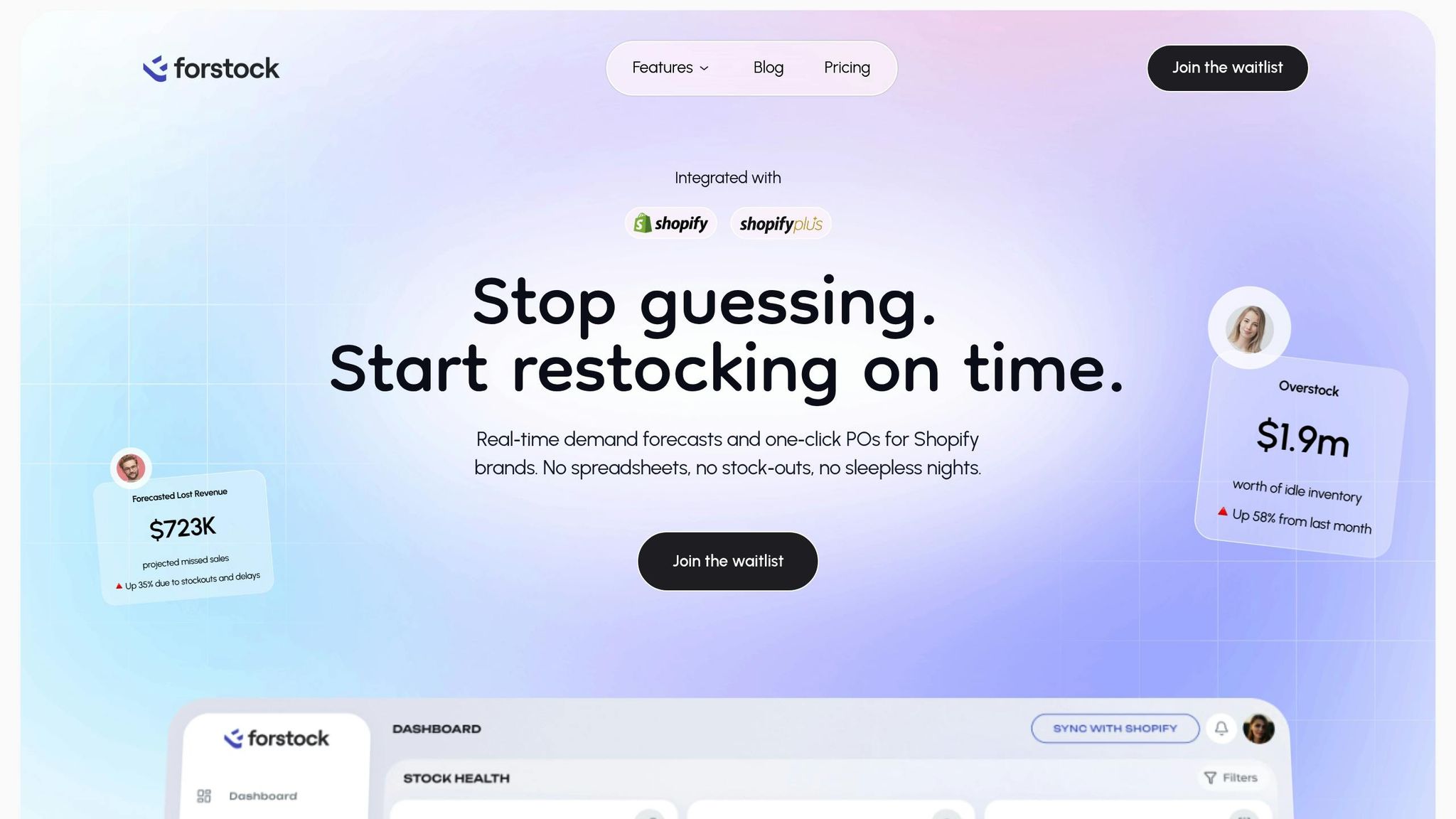
Forstock is an inventory management platform designed specifically for Shopify merchants. It aims to replace clunky spreadsheets and prevent stockouts by offering a streamlined, AI-powered solution. With features like real-time tracking, automated forecasting, and quick purchase order creation, it simplifies inventory management for businesses. Here's a closer look at what makes Forstock a standout tool.
Real-time Inventory Tracking and Updates
Forstock’s centralized dashboard provides real-time inventory updates synced directly with Shopify. Merchants can instantly see stock levels, turnover rates, and inventory value, making it easy to spot which products are selling fast and which ones are sitting idle.
"I open the dashboard in the morning and instantly know what needs reordering, what is overstocked, and what to focus on." - Emily, Inventory Manager
Using live sales data and supplier lead times, the platform sends proactive alerts to help merchants avoid running out of stock.
Automation Features
Forstock takes automation to the next level with two key tools: AI-powered demand forecasting and one-click purchase order creation. By analyzing historical sales, current trends, and seasonality, it generates accurate forecasts so merchants can restock at just the right time. The purchase order feature simplifies the process further - allowing users to create and track orders in just a few clicks, cutting down on manual work and reducing errors.
"The AI forecast actually makes sense for my business. It feels like having a supply chain manager on my team." - Sophie, E-commerce Manager
Pricing
Forstock keeps things simple with a flat rate of $39/month, making it accessible for both startups and established businesses. Every plan includes a 14-day free trial and live chat support, so merchants can test the platform before committing.
Integration with Shopify and Other Sales Channels
Built with Shopify in mind, Forstock offers native integration that syncs inventory data, orders, and supplier details in real time. It also supports multi-location inventory management, enabling businesses to monitor stock across warehouses, retail stores, and fulfillment centers - all from one dashboard. Additional features like 12-month demand planning and centralized supplier communication help merchants maintain the right inventory levels while keeping operational tasks under control.
2. Katana Cloud Inventory
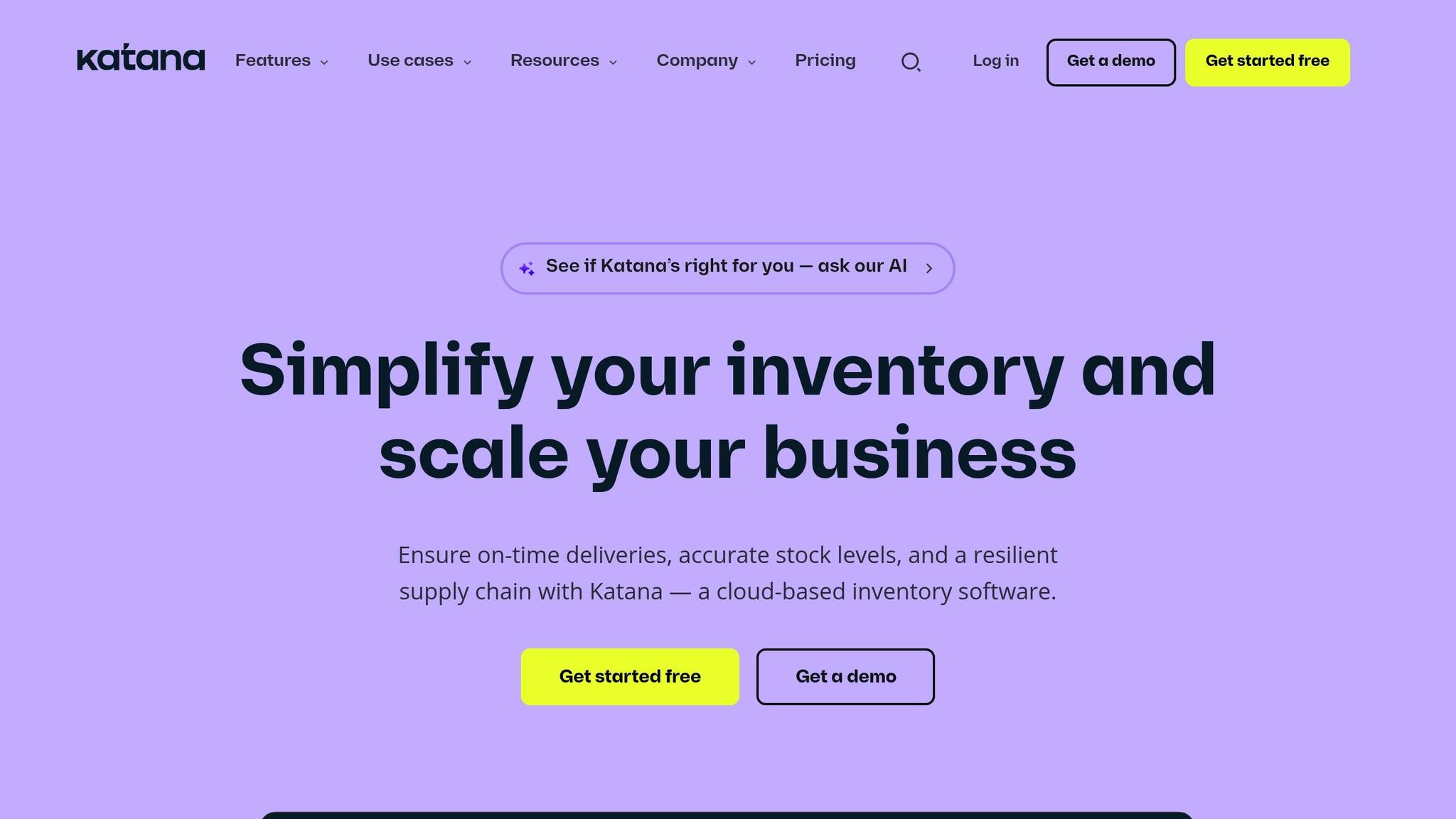
Katana Cloud Inventory is designed specifically for Shopify merchants who deal with complex, multi-variant, or made-to-order products. Its user-friendly, drag-and-drop interface makes inventory management straightforward, even for those without technical expertise. By utilizing real-time data and automation, Katana helps Shopify merchants efficiently manage their operations.
Real-time Inventory Tracking and Updates
Katana offers live inventory insights and full traceability, allowing merchants to monitor stock levels across both online and offline channels. With multi-location management, users can easily track inventory across warehouses, stores, and fulfillment centers. This real-time visibility is especially beneficial for businesses navigating intricate supply chains.
Automation Features
Katana streamlines inventory management with features like one-click purchase order creation, smart reordering triggers, and demand forecasting. These tools help optimize production schedules and minimize the risk of stockouts. The platform also supports tracking product recipes (BOMs) and variations, ensuring accurate planning for stores with diverse product lines. According to user feedback, businesses using Katana have reported cutting their manual inventory management time by up to 50% after adopting the platform.
Pricing
Katana offers a tiered pricing model, starting at $99 per month for the Essential plan. Advanced and Professional plans are available for businesses needing more robust features and integrations. All plans include Shopify integration, real-time inventory tracking, and basic automation, while higher-tier plans provide advanced automation and analytics. Pricing is in USD, billed monthly, with discounts for annual subscriptions and a 14-day free trial available.
Integration with Shopify and Other Sales Channels
Katana integrates directly with Shopify, automatically syncing inventory, orders, product data, and fulfillment details between the two platforms. This native integration ensures that stock levels, order processing, and product updates are always current, eliminating the need for manual updates. Beyond Shopify, Katana connects with other major e-commerce platforms, accounting tools like QuickBooks and Xero, and shipping solutions, offering a centralized system for managing inventory and finances. With a 4.8/5-star rating on the Shopify App Store, users frequently highlight the platform’s intuitive design, real-time updates, and responsive customer support.
3. syncX: Stock Sync
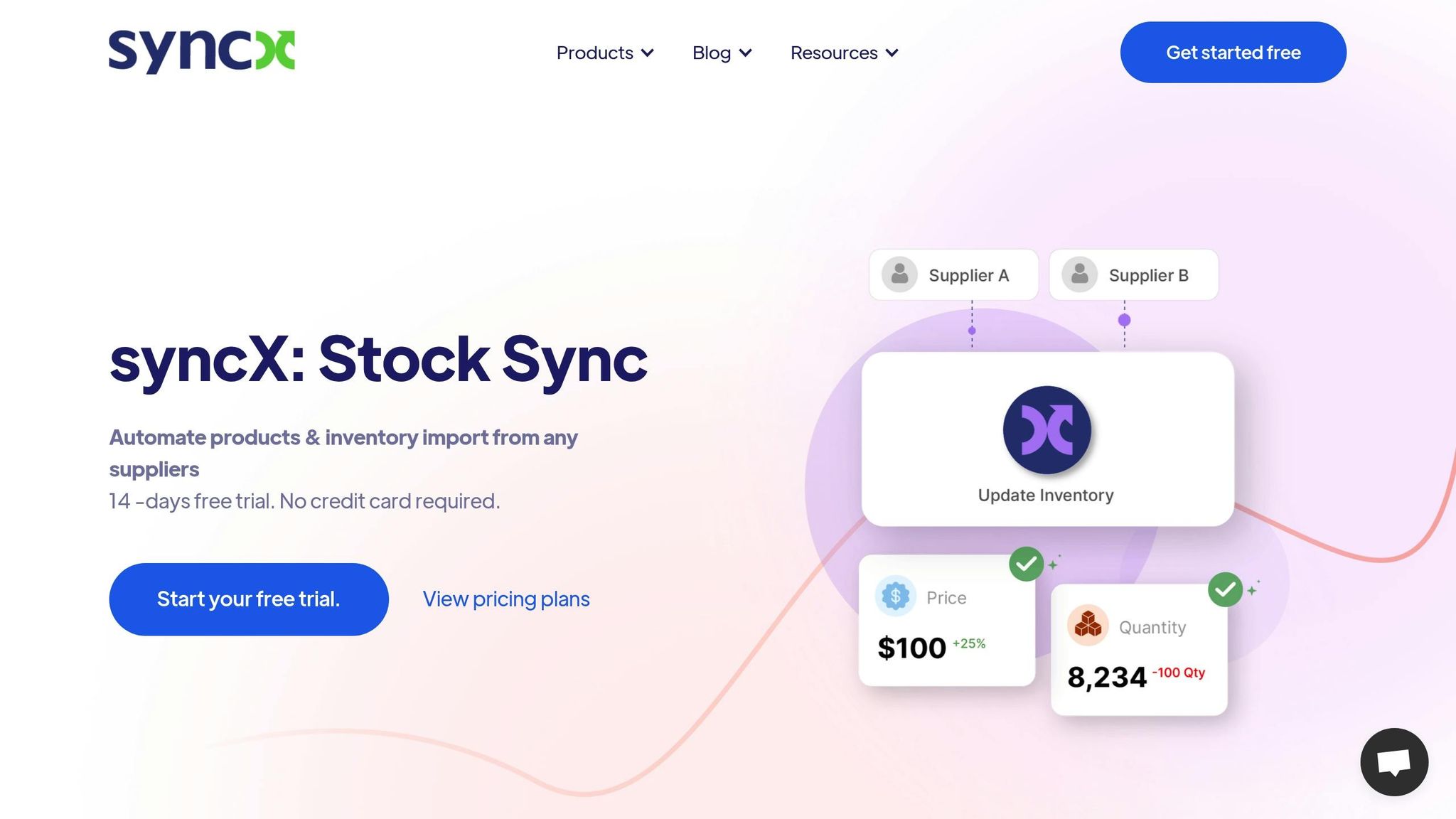
syncX: Stock Sync is a cloud-based inventory management tool designed for Shopify users. At this time, specific details about its features, pricing, and integrations remain unverified.
We'll provide more information as soon as reliable updates become available, ensuring you have the same level of detail here as with the other solutions on this list. Stay tuned!
4. Shopify POS Inventory Management
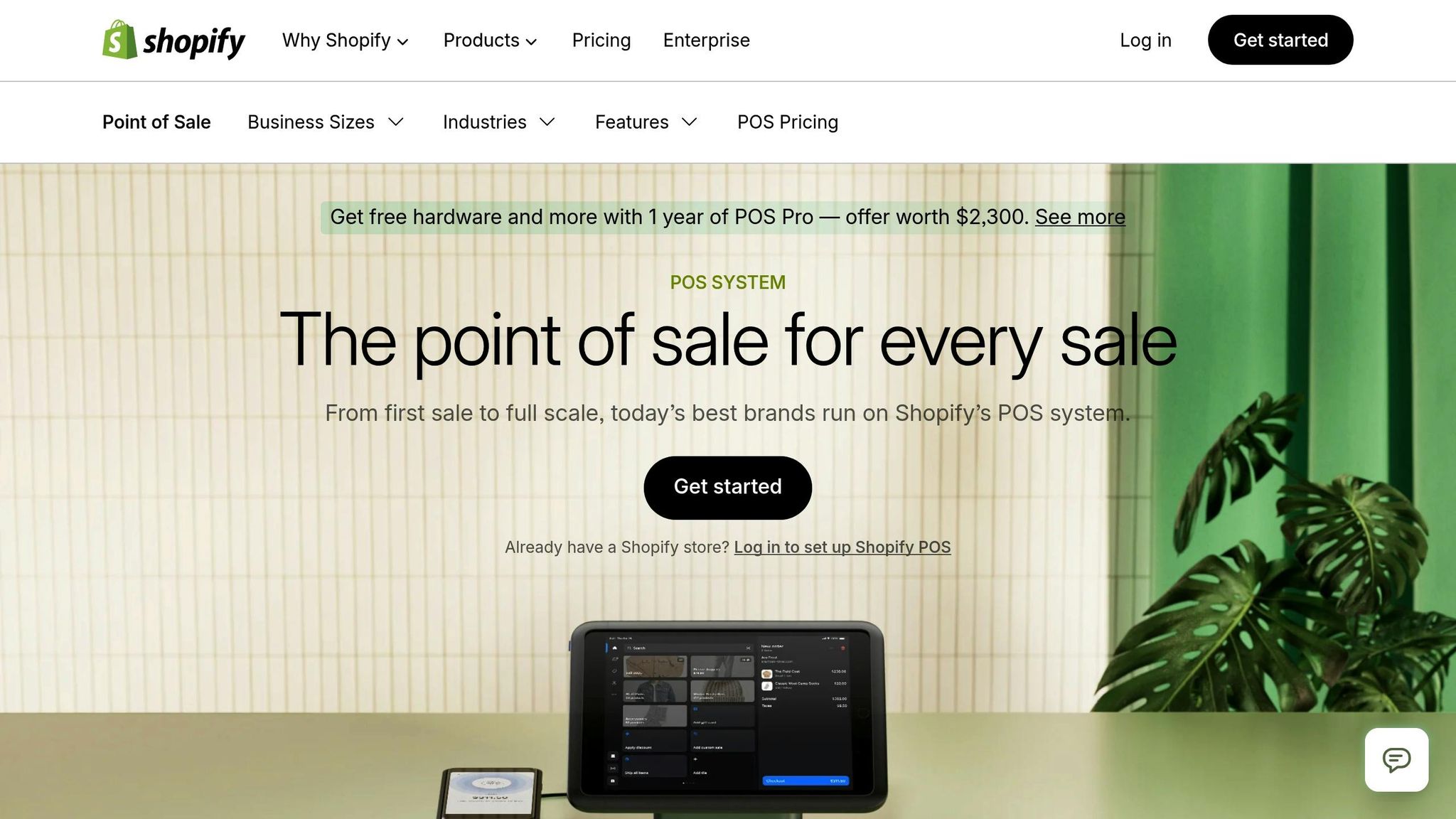
Shopify POS Inventory Management simplifies the process of managing stock across both online and physical stores by syncing inventory automatically. This ensures seamless coordination between your Shopify store and brick-and-mortar locations.
Real-time Inventory Tracking and Updates
Shopify POS keeps inventory updated in real time. Whenever a customer makes a purchase - whether online or in-store - the system instantly adjusts stock levels across all channels. This eliminates the need for manual updates and helps minimize the risk of overselling.
Shopify's internal data highlights the benefits: merchants using their POS system report 30% fewer stockouts and a 20% drop in manual inventory errors. The platform also provides low-stock alerts, giving you a clear view of inventory levels at all times to help you avoid running out of popular items.
For businesses with multiple locations, Shopify POS offers multi-location inventory management. You can monitor stock levels at individual stores, warehouses, or fulfillment centers, transfer items between locations, and even fulfill online orders from the nearest store. This not only reduces shipping times but can also lower costs.
All of these inventory features integrate seamlessly with Shopify's broader e-commerce tools, creating a unified system for managing your business.
Integration with Shopify and Other Sales Channels
Shopify POS is designed to handle multi-channel sales, making it easy to manage inventory for online stores, physical retail locations, and social commerce - all from a single dashboard. It also supports multiple locations natively. However, if you want to integrate with external marketplaces like Amazon or eBay, you'll likely need third-party apps to extend the functionality beyond Shopify's core system.
Automation Features
The platform includes basic automation tools, such as automatic stock syncing and low-stock notifications. While these features are helpful, Shopify POS does not currently offer advanced automation options like AI-driven demand forecasting or automated purchase orders. Businesses requiring more sophisticated inventory planning often turn to third-party apps to fill these gaps.
Pricing
Shopify POS Pro is priced at $89 USD per month per location, in addition to your existing Shopify subscription. While this pricing might be higher than standalone inventory management apps, it offers the advantage of combining inventory and POS functionality into one system. For businesses running both online and physical stores, this integration reduces operational complexity and eliminates the need for separate inventory systems, making it a worthwhile investment.
5. Cin7

Cin7 is a cloud-based inventory management system designed for businesses juggling complex, multi-channel Shopify operations. If you're managing multiple SKUs, warehouses, and sales channels, this platform can help streamline your processes.
Real-time Inventory Tracking and Updates
Cin7 shines when it comes to real-time tracking. Whether you're selling on Shopify, Amazon, or other platforms, the system updates inventory levels instantly across all channels. This minimizes the risk of overselling and keeps your stock data accurate at all times.
The platform also includes advanced inventory controls like barcode scanning and batch tracking, which are crucial for businesses with intricate needs. You'll know exactly how much inventory is available at each location and can route orders to the most efficient warehouse for quicker delivery. These real-time updates aren't just convenient - they're the backbone of Cin7's automation features, ensuring your inventory stays in sync with demand.
According to Cin7's data, businesses using the platform can cut stockouts by up to 70% and boost order fulfillment accuracy by over 90% when fully implemented. This level of precision not only keeps customers happy but also reduces the headaches caused by inventory mismatches.
Automation Features
Cin7 takes inventory management to the next level with automation. It handles stock replenishment by generating purchase orders based on custom reorder thresholds, sales trends, and supplier lead times. With demand forecasting built in, the platform can reduce manual inventory tasks by as much as 80%.
Order routing is another area where Cin7 excels. The system automatically directs orders to the most suitable fulfillment location based on your rules. This saves time and allows you to focus on growing your business instead of constantly monitoring stock levels or manually creating purchase orders.
Integration with Shopify and Other Sales Channels
Cin7 integrates directly with Shopify, syncing product listings, inventory levels, and order data between the two platforms. Changes made in Cin7 are instantly reflected in your Shopify store, and vice versa, ensuring everything stays in sync.
The platform also connects with other major sales channels like Amazon, eBay, and Walmart, as well as accounting tools like QuickBooks and Xero. It even integrates with shipping providers, giving you a centralized hub to manage your entire operation, no matter how many channels you sell through.
Pricing
Cin7's pricing starts at around $325 USD per month for the Core plan, with custom pricing available for more complex setups. While this is higher than some basic inventory tools, the cost reflects the platform's extensive features and automation capabilities.
All plans include core inventory management, automation, and integration tools. However, advanced analytics or certain integrations may come with additional costs, depending on your needs. To help you get started, Cin7 offers onboarding support and training resources, ensuring you can make the most of your investment.
For Shopify brands dealing with large inventories across multiple channels and locations, Cin7's automation and integration features can save significant time and improve operational efficiency - making the higher price tag worth it for many businesses.
6. Zoho Inventory

Zoho Inventory is a cloud-based inventory management tool designed for Shopify merchants. It offers a range of features tailored to small and mid-sized businesses, providing reliable inventory control without breaking the bank.
Real-time Inventory Tracking and Updates
With Zoho Inventory, you get real-time tracking that updates stock levels automatically when orders are placed or new inventory arrives. This ensures accurate stock counts, helping you avoid overselling or running out of products. Beyond basic tracking, Zoho lets you set custom reorder points for each item and sends low-stock alerts to keep your sales running smoothly.
Reports from users suggest impressive results: a 30–50% drop in stockouts and a 25% boost in order fulfillment speed after switching to Zoho Inventory. Additional features like barcode scanning, batch tracking, and serial number management make it particularly useful for businesses managing complex product variations. The system also supports inventory monitoring across multiple sales channels and locations, with higher-tier plans accommodating up to 20 warehouses.
This level of precision forms the backbone for automating your inventory operations effectively.
Automation Features
Zoho Inventory simplifies inventory management by automating essential tasks. It can generate purchase orders when stock runs low, handle order fulfillment, and manage invoicing and shipment tracking. While it lacks advanced AI-driven demand forecasting, it does provide basic sales analytics and inventory reports to help you plan ahead.
Case studies highlight that these automation tools can cut manual inventory management time by as much as 70%. For instance, a Shopify merchant selling apparel online and in physical stores can rely on Zoho Inventory to automatically update stock levels after each sale, create purchase orders when inventory dips, and fulfill orders from the nearest warehouse.
Integration with Shopify and Other Sales Channels
Zoho Inventory integrates seamlessly with Shopify, syncing product listings, orders, and inventory levels between the two platforms. Any changes made in Shopify or Zoho are quickly reflected, eliminating the need for manual updates.
The platform also connects with other sales channels like Amazon, eBay, Etsy, and WooCommerce. This centralized inventory management ensures consistency across platforms, reducing errors and discrepancies.
Pricing
Zoho Inventory offers flexible pricing plans to match your business needs. All plans are billed monthly in U.S. dollars, with discounts for annual subscriptions:
- Free plan: Includes 50 orders/month and one warehouse
- Standard plan: $39/month for up to 1,500 orders monthly, 2 warehouses, and Shopify integration
- Professional plan: $79/month for up to 7,500 orders monthly, 5 warehouses, and more advanced automation
- Premium plan: $199/month for up to 30,000 orders monthly, 20 warehouses, and the full suite of features
Zoho Inventory has earned an average rating of 4.5/5 on the Shopify App Store, based on over 1,200 reviews. Users frequently highlight its automation tools, multi-channel integration, and user-friendly interface. However, some have noted a learning curve for advanced features and occasional syncing issues with larger product catalogs. Thanks to its scalable pricing and versatile features, Zoho Inventory is an appealing choice for Shopify merchants looking for an efficient, cloud-based inventory solution.
sbb-itb-f0fc809
7. inFlow Inventory
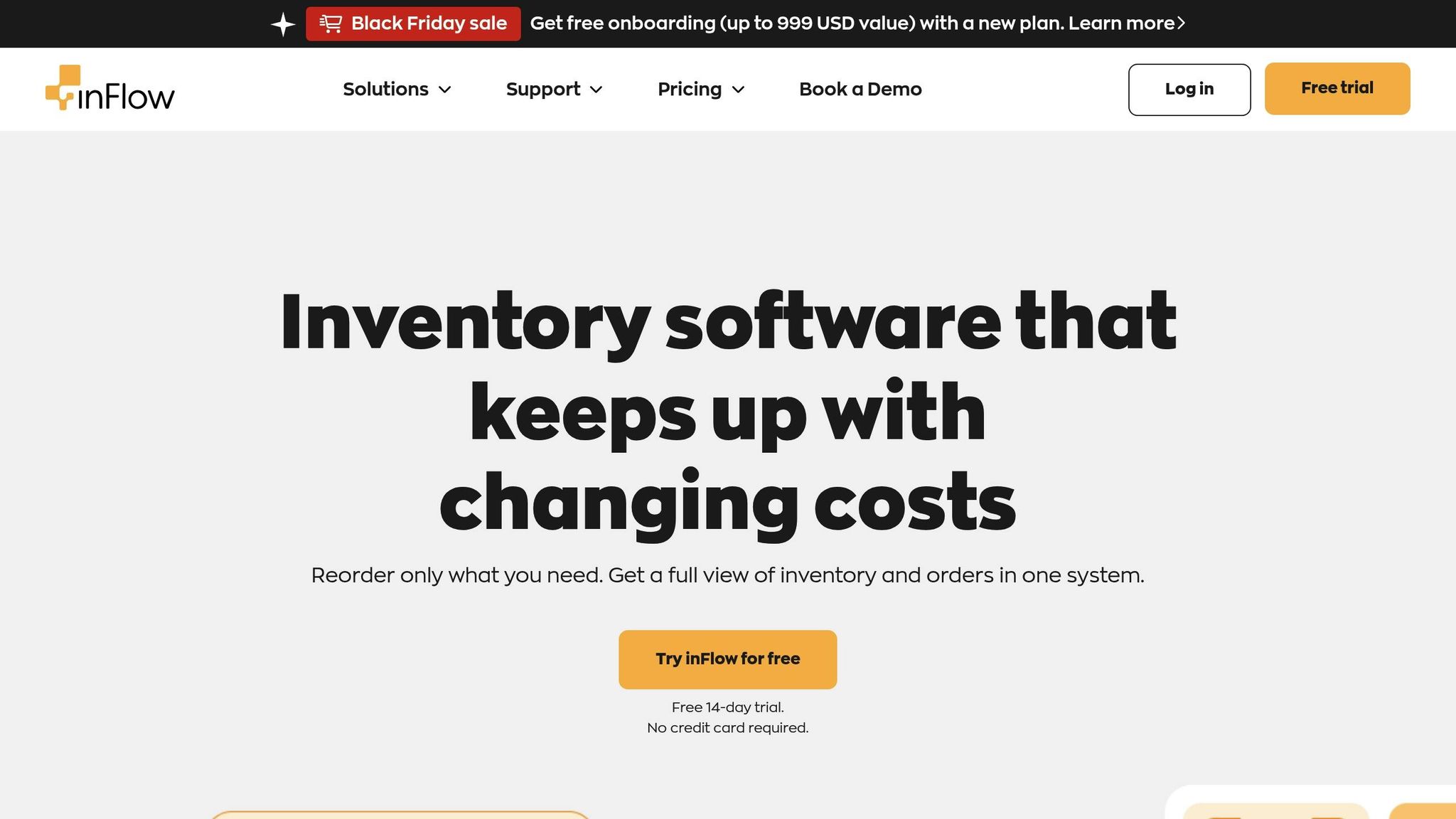
inFlow Inventory is a cloud-based solution tailored for small to medium-sized businesses, particularly Shopify merchants. With over 40,000 businesses worldwide relying on it, inFlow has become a trusted option for those looking to manage their inventory efficiently.
Real-Time Inventory Tracking
inFlow Inventory offers real-time tracking that keeps stock levels updated as sales, returns, and new inventory are processed. This ensures accuracy across all connected channels. Features like barcode scanning and mobile stocktaking make managing inventory easier and more precise. The platform claims to help businesses reduce stockouts by up to 70% and cut manual inventory management time by more than 50%. For example, Shopify merchants can automate alerts for fast-selling items and receive notifications when stock drops below a set threshold.
Automation Tools
Beyond tracking, inFlow simplifies operations with automation tools. It can automatically generate purchase orders and forecast demand when inventory runs low. Customizable rules and alerts help prevent overselling and stock mismatches. The platform also provides detailed analytics on sales trends, inventory turnover, and supplier performance, enabling smarter business decisions.
Shopify and Multi-Channel Integration
inFlow integrates seamlessly with Shopify, syncing product data, stock levels, and order information in real time. Any updates made in one system are instantly reflected in the other. Additionally, it supports connections with over 95 platforms, including Amazon, eBay, WooCommerce, and QuickBooks. This centralized system ensures consistency across all sales channels and optimizes order fulfillment by routing orders to the nearest warehouse.
Pricing
inFlow Inventory offers flexible pricing plans to suit businesses at different stages:
- Entrepreneur plan: $89/month – includes basic inventory and order management tools.
- Small Business plan: $219/month – adds features like serial number tracking, custom fields, and full Shopify integration.
All plans come with a free trial, and pricing varies based on the number of users and locations managed. With an average rating of 4.6/5 on platforms like Capterra and G2, users often highlight its intuitive design, detailed analytics, and responsive customer support. However, some note that advanced features may increase costs, and occasional syncing delays can occur.
With its blend of tools, integrations, and pricing options, inFlow Inventory stands out as a strong choice for Shopify merchants navigating the complexities of inventory management.
8. SKULabs
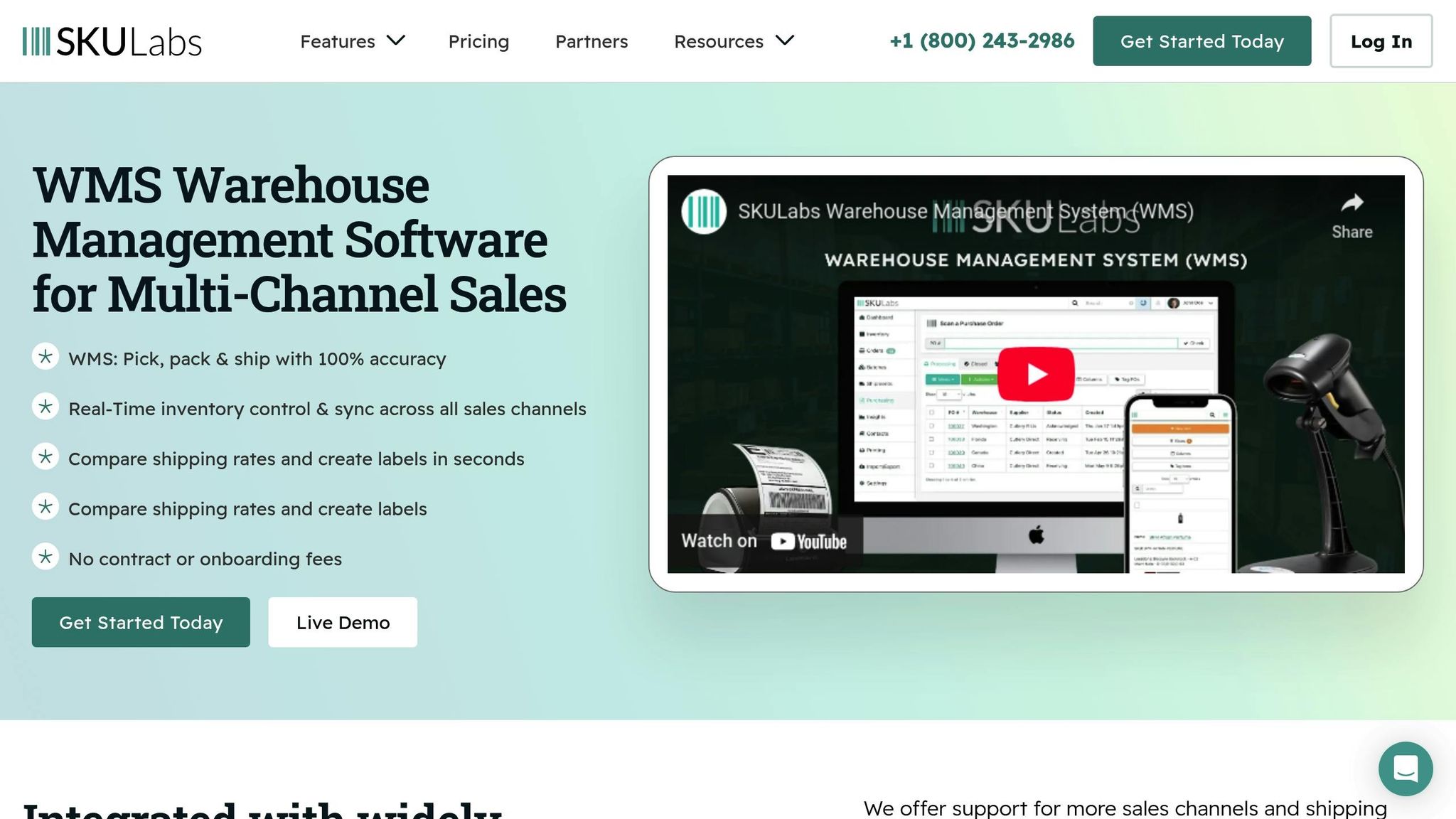
SKULabs is a cloud-based inventory management and shipping platform that boasts an impressive 4.8/5 rating on the Shopify App Store.
Real-Time Inventory Tracking and Updates
SKULabs simplifies inventory management by offering real-time tracking across multiple sales channels and warehouses - all accessible from a single dashboard. Its barcode scanning feature minimizes manual errors during picking and packing, ensuring greater accuracy and efficiency in order fulfillment.
The platform also automates stock updates across locations, kickstarts pick-and-pack processes, and even generates purchase orders when inventory runs low. These features make it easier for merchants to stay on top of their stock levels without constant manual intervention.
Automation Features
In addition to real-time tracking, SKULabs takes operations to the next level with its automation tools. Routine inventory tasks, like managing purchase orders, are automated to save time and reduce errors. Features like order routing, batch processing, and fulfillment automation can shave hours off a merchant’s weekly workload. However, it’s worth noting that SKULabs does not include advanced AI-driven demand forecasting.
To further prevent stock issues, the platform offers automated alerts and customizable reorder points. These tools help merchants avoid stockouts and overstocking, which can improve cash flow and cut down on unnecessary storage costs.
Integration with Shopify and Other Sales Channels
SKULabs integrates seamlessly with Shopify, automatically syncing inventory, orders, and product data in real time. Beyond Shopify, it connects with other major platforms like Amazon, eBay, and Walmart, giving merchants centralized control over their inventory. This multi-channel integration ensures consistent stock levels, smooth order fulfillment, and a clear view of operations across all sales channels.
Pricing
SKULabs starts at $299 per month for its base plan, positioning it as a premium option among Shopify inventory tools. Higher-tier plans are available for businesses with larger needs, with pricing based on factors like order volume, user count, and additional integrations. While the cost may be higher than basic inventory apps, merchants often find the robust feature set worth the investment.
A free trial is typically available, allowing businesses to test the platform before committing. That said, some users have pointed out that the initial setup can be challenging, particularly for stores with extensive catalogs or multiple locations. Additionally, staff unfamiliar with barcode workflows may face a learning curve during the onboarding process.
9. Sumtracker

Sumtracker Inventory & Bundles is a cloud-based tool designed for Shopify merchants who deal with product bundles and multi-location operations. Its standout feature is real-time inventory tracking, which simplifies the complexities of managing bundles while keeping stock levels accurate across multiple locations.
Real-Time Inventory Tracking and Updates
Sumtracker takes the guesswork out of inventory management by automatically updating stock levels for individual products and bundles as sales, returns, or new stock come in. This ensures merchants always have the most accurate inventory data, helping to prevent overselling and stockouts.
One of its biggest advantages is how it automates the reconciliation process for bundle sales. For businesses selling kits or product combinations, this feature ensures inventory accuracy without the need for manual adjustments.
The platform also supports multi-location tracking, enabling merchants to monitor inventory across various warehouses or retail locations through a single dashboard. This means merchants can efficiently track stock levels, transfers, and fulfillment, ensuring seamless order management and visibility across all locations.
Automation Features
Sumtracker makes operations smoother with features like bulk inventory updates and instant low-stock notifications. These tools help merchants restock efficiently, reduce manual work, and ultimately improve customer satisfaction.
The low-stock alerts are especially helpful for avoiding stockouts, ensuring merchants can maintain optimal inventory levels. Additionally, the ability to update inventory for multiple products at once saves significant time, particularly for businesses managing large catalogs or adjusting seasonal stock and pricing across multiple SKUs.
Integration with Shopify and Other Sales Channels
Sumtracker integrates directly with Shopify, syncing inventory data in real time. Beyond Shopify, it connects with other major sales platforms like Amazon, eBay, and WooCommerce. This allows merchants to manage their inventory across multiple channels from a single interface.
This multi-channel integration ensures consistent stock levels across platforms, reducing the risk of overselling. Any inventory changes made on one channel are immediately reflected across all connected sales channels, providing a unified and accurate view of stock.
Pricing
Sumtracker offers flexible pricing plans ranging from $49 to $299 per month, depending on the features needed. This tiered structure allows merchants to pick a plan that fits their current operations while leaving room for growth. Prices are listed in USD for U.S.-based merchants, with no hidden fees. Merchants can upgrade or downgrade as their needs evolve, making it a practical choice for businesses managing complex inventory across multiple platforms. For more details, check out the Feature and Pricing Comparison.
10. Prediko
Prediko is a cloud-based platform designed to simplify inventory management for Shopify merchants. By replacing cumbersome spreadsheets with AI-driven tools, it helps businesses avoid stockouts and overstock issues through demand forecasting and automated purchase order creation [4,14].
Real-Time Inventory Tracking and Updates
Prediko keeps inventory data accurate and up-to-date by syncing stock levels in real time as orders come in or new inventory is added. This real-time visibility prevents overselling and ensures merchants always know their stock status. The platform supports unlimited SKUs, multiple stores, and warehouses, consolidating everything into a single, easy-to-navigate dashboard. This unified view simplifies stock transfers and improves order fulfillment efficiency.
In addition to real-time tracking, Prediko incorporates automation to take inventory management to the next level.
Automation Features
With AI-powered demand forecasting, Prediko analyzes sales trends and seasonal patterns to predict future needs. It even automates the creation of purchase orders based on preset stock thresholds, saving merchants up to three hours daily. Other helpful features include automated low-stock alerts, bill of materials (BOM) management for manufacturers, and customizable reports with advanced filtering options to streamline restocking decisions [4,6,15].
These automation tools work seamlessly with Prediko's integration capabilities, making it an even more powerful tool for multi-channel sellers.
Integration with Shopify and Other Sales Channels
Prediko integrates effortlessly with Shopify through native API connections, syncing inventory data, orders, and product listings. It also supports Shopify POS, B2B platforms, and connects with over 60 additional channels, including Amazon, eBay, Walmart, and various warehouse management systems. This centralization allows merchants to manage all their inventory from one place, ensuring consistency across multiple sales channels [4,15].
Pricing
Prediko offers plans ranging from $0 to $349 per month, making it accessible to businesses of all sizes. The free plan covers basic features ideal for smaller operations, while premium plans unlock advanced tools like enhanced forecasting, automation, and detailed analytics. Pricing is in USD, with straightforward monthly billing. Merchants also benefit from personalized onboarding and dedicated support to help them get the most out of the platform [4,14].
Feature and Pricing Comparison
When selecting an inventory management tool for your Shopify store, it's essential to weigh features against pricing to find the best fit for your needs. Options range from free tools to enterprise-level solutions that can cost hundreds of dollars per month.
For those on a tight budget, syncX: Stock Sync offers plans starting at $0 and going up to $25 per month. Similarly, Shopify POS Inventory Management is free for users of Shopify POS, making it a cost-effective choice for basic inventory tracking.
In the mid-range category, tools like Forstock ($39/month), Zoho Inventory (starting at $29/month), and Sumtracker ($49–$299/month) strike a balance between affordability and advanced features. These tools often include perks like AI-powered forecasting and support for managing inventory across multiple locations.
For larger operations, enterprise-grade solutions like Prediko (priced between $0 and $349/month) and others such as Katana Cloud Inventory, Cin7, inFlow Inventory, and SKULabs require custom quotes. These tools cater to businesses with more complex needs, offering robust features like detailed analytics, automation, and multi-location management. Below is a quick comparison of key tools:
| Tool | Pricing (USD/month) | Key Features | Shopify Integration | Main Benefits |
|---|---|---|---|---|
| Forstock | $39 | AI forecasting, automated POs, real-time analytics | Native integration | Reduces overstock, prevents stockouts, 95% forecast accuracy |
| Katana Cloud Inventory | Contact for quote | Production planning, real-time tracking, multi-location | Yes | Tailored for manufacturing, detailed analytics |
| syncX: Stock Sync | $0 - $25 | Bulk updates, supplier integration, automated scheduling | Yes | Affordable automation for basic needs |
| Shopify POS | Free (with POS) | Unified online/offline inventory, basic tracking | Native | Simple setup, no extra cost |
| Cin7 | Contact for quote | Multi-location, advanced analytics, automation | Yes | Scalable solution for larger businesses |
| Zoho Inventory | $29+ | Multi-channel management, automation, reporting | Yes | Comprehensive features at a competitive price |
| inFlow Inventory | Contact for quote | Real-time tracking, multi-location, detailed analytics | Yes | Strong tracking and reporting capabilities |
| SKULabs | Contact for quote | Barcode scanning, multi-channel, real-time updates | Yes | Focused on accuracy and warehouse efficiency |
| Sumtracker | $49 - $299 | Product bundling, bulk updates, real-time tracking | Yes | Specialist in managing bundled products |
| Prediko | $0 - $349 | AI forecasting, automated POs, 60+ integrations | Native API | Saves time with automation, extensive integrations |
Choosing the Right Tool for Your Store
The right tool depends on your store's size, complexity, and budget. Basic tools like syncX are perfect for smaller stores that need simple stock syncing. Meanwhile, medium-sized businesses might find the advanced features of Forstock or Zoho Inventory more appealing, especially for their cost-effective automation and forecasting capabilities.
For larger stores with complex operations, enterprise-level solutions like Prediko or Katana Cloud Inventory offer robust features designed to handle high volumes, multiple locations, and detailed analytics. These tools often include custom pricing, which can scale with your business as it grows.
Scalability is an important factor to keep in mind as your store expands. Fixed-price solutions like Forstock remain predictable at $39/month, regardless of revenue or SKU count, making them a reliable choice for growing businesses. On the other hand, enterprise tools with custom pricing often provide unlimited SKUs and advanced functionality, catering to high-volume merchants.
Ultimately, your decision comes down to your store’s specific needs. Affordable tools work well for smaller operations, while AI-powered and enterprise solutions are better suited for high-volume stores looking to streamline processes and improve forecasting accuracy.
Conclusion
For Shopify brands looking to scale in 2025, cloud-based inventory management tools are a game-changer. By leveraging automation, real-time data, and seamless integrations, these platforms transform inventory management from a tedious task into a powerful growth driver.
The benefits of automation speak for themselves. As Liam, an Operations Director, put it:
"The forecasts are accurate, the purchase order flow is seamless, and my team actually enjoys using it. We have cut manual inventory tasks by at least 60%."
This kind of efficiency not only saves hours of manual work but also ensures real-time accuracy in inventory tracking, allowing merchants to focus on expanding their businesses.
Real-time visibility across all sales channels is another major advantage. It helps avoid costly errors and overstocking. Advanced inventory tools can reduce excess inventory by up to 30% and speed up order fulfillment by 25%, directly improving profitability.
These tools also integrate effortlessly with Shopify and other key business systems. This integration eliminates manual errors, cutting them by more than 50% compared to outdated spreadsheet-based methods. By streamlining operations, these platforms set the stage for sustained growth.
FAQs
How do cloud-based inventory tools work with Shopify to optimize inventory management?
Cloud-based inventory tools integrate seamlessly with Shopify, simplifying how you manage your inventory. These tools ensure your product listings, orders, and stock levels stay in sync in real time, giving you an accurate view of your inventory across your entire catalog.
They offer features like demand forecasting, automated purchase order creation, and in-depth inventory analytics. These capabilities help you avoid running out of stock, cut down on overstock, and make better purchasing decisions. By consolidating your inventory data and automating repetitive tasks, these tools free up your time so you can focus on scaling your business.
What features should a growing Shopify store prioritize in a cloud inventory tool?
A reliable cloud inventory tool for Shopify should include features like real-time demand forecasting to predict sales trends, automated purchase order creation to reduce manual tasks, and inventory analytics to fine-tune stock levels. It’s also essential to have a centralized dashboard that makes supplier management easier, monitors inventory across multiple locations, and offers insights to guide smarter decisions. These tools can simplify your workflow and help you stay ready to meet customer needs efficiently.
How does automation in inventory management help avoid stockouts and overstocking?
Automation in inventory management takes the hassle out of keeping stock levels just right. By analyzing real-time sales data, lead times, and demand trends, it helps ensure you reorder products at the perfect time - avoiding those frustrating stockouts that can cost you sales.
On the flip side, automation also helps cut down on overstocking. With smarter forecasting, you can keep from locking up cash in inventory you don’t need. Tools like Forstock make it easier to handle routine tasks, make better purchasing choices, and shift your focus to growing your business with peace of mind.



.png)
.png)


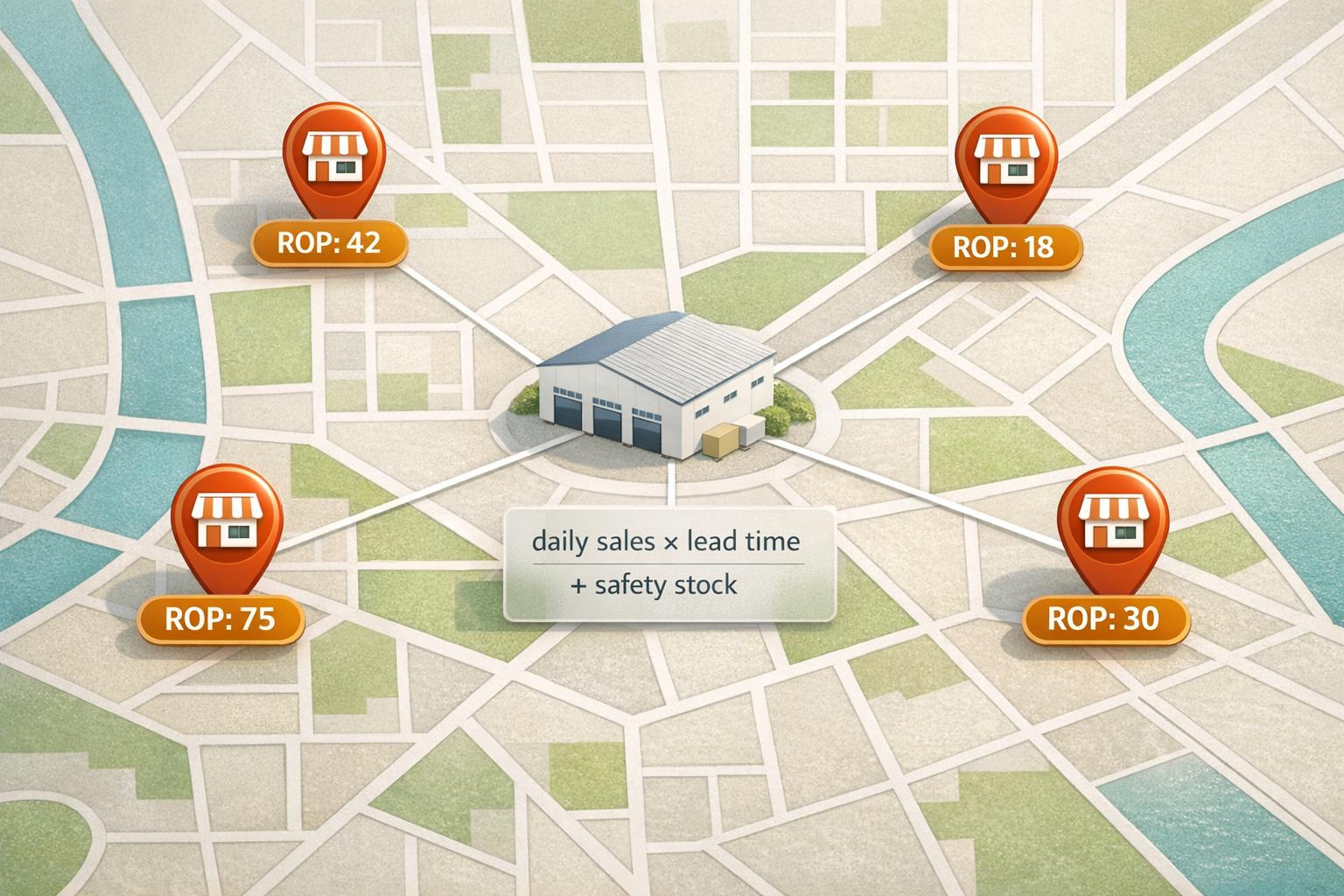
.png)
.png)
.png)
.svg)